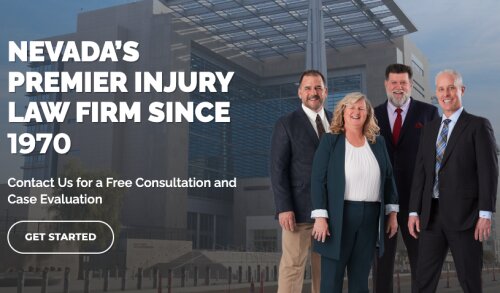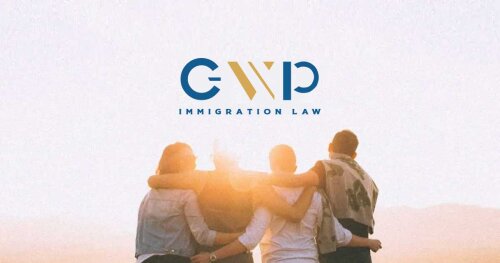Best Employment Rights Lawyers in Las Vegas
Share your needs with us, get contacted by law firms.
Free. Takes 2 min.
List of the best lawyers in Las Vegas, United States
About Employment Rights Law in Las Vegas, United States
Employment rights in Las Vegas are governed by a mix of federal laws, Nevada state statutes, and any applicable local ordinances. Federal laws set baseline protections for issues like discrimination, wage and hour rules, family and medical leave, workplace safety, and the right to organize. Nevada law often supplements or strengthens those protections and adds state-specific rules for wages, workplace discrimination, workers compensation, unemployment insurance, and employer licensing. Many employers in Las Vegas are in hospitality, gaming, construction, and service industries, so industry-specific rules and union contracts can also play a large role in what rights employees have on the job.
Why You May Need a Lawyer
Employment disputes can be complicated, time-sensitive, and high-stakes. You may need a lawyer if you face any of the following situations:
- Alleged workplace discrimination or harassment based on race, sex, disability, age, religion, national origin, pregnancy, sexual orientation, or gender identity.
- Wrongful termination or retaliation after reporting illegal conduct, filing a complaint, or asserting a legal right.
- Wage and hour issues such as unpaid overtime, unpaid final wages, misclassification as an independent contractor, or other wage theft.
- Denied or disputed workers compensation claims after a job-related injury or illness.
- Denial of family or medical leave or disputes under the federal Family and Medical Leave Act (FMLA) and related state leave laws.
- Retaliation for whistleblowing, safety complaints, or exercising protected rights like taking protected leave or filing a claim.
- Negotiating, interpreting, or defending noncompete agreements, severance packages, or employment contracts.
- Union or collective bargaining issues, including representation and unfair labor practice complaints.
An employment lawyer can explain your rights, evaluate evidence, advise on administrative filings and deadlines, negotiate with an employer, and represent you in mediation or court if necessary.
Local Laws Overview
Here are key local and state-level aspects to understand in Las Vegas.
- At-will employment. Nevada generally follows the at-will employment rule, which allows either employer or employee to end the employment relationship at any time for any lawful reason. Exceptions include discrimination, retaliation, breach of a written or implied contract, or public policy violations.
- Anti-discrimination and harassment. Nevada law and federal law prohibit employment discrimination and harassment on a variety of protected characteristics. Employers are generally required to prevent and address harassment and may be liable for hostile work environments and discriminatory actions.
- Wage and hour rules. Federal Fair Labor Standards Act rules apply for minimum wage, overtime, recordkeeping, and child labor. Nevada state law also regulates payment of wages, timing of final paychecks, and other wage-related protections. Worker classification rules determine whether you are entitled to employee protections or paid as an independent contractor.
- Leave laws. The FMLA provides unpaid, job-protected leave for eligible federal-covered employees. Nevada and local ordinances may provide additional leave rights or paid leave in certain circumstances. Short-term disability, pregnancy accommodation, and other leaves can also intersect with federal protections like the Americans with Disabilities Act.
- Workers compensation. Nevada requires employers to carry workers compensation insurance for workplace injuries. The claims process has its own procedures, medical evaluation rules, and deadlines.
- Workplace safety. Workplace safety is governed federally by OSHA and by Nevada safety enforcement where applicable. Employees have the right to a safe workplace and to raise safety concerns without retaliation.
- Unemployment insurance. The Nevada agency that administers unemployment benefits sets eligibility rules and procedures for filing appeals if benefits are denied.
- Public sector and union rules. Public employees and unionized workers may have additional procedural protections, grievance and arbitration processes, and collective bargaining agreements that affect rights at work.
Because laws and rules can change, and some protections differ by industry or employer size, consult an attorney or the relevant agency for current details.
Frequently Asked Questions
Am I an at-will employee or do I have job protection?
Most employees in Nevada are at-will, meaning either party can terminate the relationship without cause. Job protection may exist if you have an employment contract that limits termination, are covered by a union collective bargaining agreement, or your termination would violate discrimination or public policy protections. If you believe you were fired for an unlawful reason, speak to a lawyer to review the facts and any written agreements.
What should I do if I believe I was discriminated against or harassed?
Document incidents in detail - dates, times, locations, witnesses, and what was said or done. Report the conduct to your supervisor or human resources if it is safe to do so and follow any internal complaint procedures. Preserve emails and messages. Consider filing an administrative charge with the appropriate agency promptly, since filing deadlines can be short. An employment lawyer can help you prepare a claim and advise about next steps.
How long do I have to file a discrimination claim?
Deadlines vary by law and agency. Federal discrimination charges to the Equal Employment Opportunity Commission often must be filed within 180 days of the alleged act, with extensions to 300 days in some circumstances. State agency deadlines can differ. Because these deadlines are strict, start the process quickly and consult a lawyer or an administrative agency to confirm the applicable timeframe.
Am I entitled to overtime pay?
Under federal law, most non-exempt employees must receive overtime pay for hours worked over 40 in a workweek. Nevada also has wage and recordkeeping rules that affect overtime and exemption status. Exemptions apply for certain executive, professional, and administrative roles when specific tests are met. If you suspect unpaid overtime, gather time records and pay stubs and contact an attorney or wage agency for review.
What can I do if my employer will not pay my final paycheck?
State law governs timing and methods for final paychecks. If your employer fails to pay timely, document communications and try to resolve the issue through HR. If unpaid wages remain, you can file a wage claim with the state labor or labor commissioner office and consult an employment lawyer about civil actions to recover pay plus possible penalties.
Can my employer require me to sign a noncompete or confidentiality agreement?
Employers can ask employees to sign noncompete or confidentiality agreements, but enforceability depends on the agreement terms and Nevada law. Nevada courts scrutinize noncompetes for reasonableness in scope, duration, and geography. Confidentiality and trade secret protections are generally enforceable, but overly broad restrictions may be invalid. Have a lawyer review any agreement before signing.
What should I do if I am injured at work?
Seek necessary medical treatment right away and report the injury to your employer as soon as possible. File a workers compensation claim according to your employer and insurer procedures. If your claim is denied or benefits delayed, keep detailed medical and wage records and contact a workers compensation attorney who can advise on appeals and legal options.
Can I be fired for taking family or medical leave?
If you qualify for federal FMLA leave, you have the right to take unpaid, job-protected leave for certain family or medical reasons. Employers may not legally retaliate or terminate you for taking FMLA leave. State or local leave laws may provide additional protections. If your employer interferes with or retaliates against you for taking protected leave, consult a lawyer or file a complaint with the appropriate agency.
What is the process for filing a wage and hour complaint?
Gather pay stubs, time records, employment agreements, and any other documentation of hours worked and pay. Contact your employer or HR to raise the issue. If that does not resolve the problem, you can file a complaint with the state labor office or the federal Department of Labor, depending on the claim. An employment attorney can help evaluate your case and, if appropriate, pursue private litigation to recover unpaid wages, liquidated damages, and attorneys fees.
How do I find a lawyer and what will it cost?
Start with a referral from the local bar association, legal aid organizations, or trusted community resources. Many employment lawyers offer free initial consultations. Fee arrangements vary - some operate on contingency for wage claims or discrimination suits, meaning they get paid only if you recover money. Others charge hourly or flat fees for consultations and administrative filings. Ask about fees, expected costs, the retainer process, and possible outcomes during the first meeting.
Additional Resources
U.S. Equal Employment Opportunity Commission - Investigates federal discrimination claims and provides guidance on filing charges and enforcement procedures.
Nevada Equal Rights Commission - State agency that handles employment discrimination claims and enforcement under Nevada law.
Nevada Office of the Labor Commissioner - Responsible for state wage and hour enforcement, unpaid wages claims, and related labor issues.
Nevada Department of Employment, Training and Rehabilitation - Manages unemployment insurance and reemployment services.
Nevada Occupational Safety and Health Administration - Oversees workplace safety and health enforcement in Nevada.
National Labor Relations Board - Handles federal unfair labor practice and union representation issues for private sector employees.
Legal Aid Center of Southern Nevada and Nevada Legal Services - Provide free or low-cost legal assistance to qualifying individuals in employment and other civil matters.
State Bar of Nevada - Offers lawyer referral services and tools to help find attorneys with employment law experience.
Local union offices - In Las Vegas, many hospitality and service workers are unionized. Contact your union representative if you are a member and have a workplace issue.
University law clinics - Local law schools often operate clinics that provide legal assistance or advice to the public on selected employment matters.
Next Steps
If you believe your employment rights have been violated, take these practical steps.
- Document everything. Create a written record of incidents, dates, times, witnesses, copies of pay stubs, contracts, emails, and performance reviews. Preserve electronic messages and files.
- Follow internal procedures. If your employer has a complaint or grievance process, use it while keeping copies of what you submit and any responses you receive.
- Act quickly. Administrative filing deadlines can be short. Contact the appropriate agency or an employment lawyer early to preserve your rights.
- Seek confidential legal advice. A lawyer can evaluate your case, explain options, and help with agency filings, negotiations, or litigation. Many attorneys offer free initial consultations.
- Consider alternate dispute resolution. Mediation or arbitration may resolve matters faster than court, but be aware of any arbitration agreements that affect your ability to pursue a claim in court.
- Protect your health and finances. If you are injured or sick, get medical care and understand short-term steps for workers compensation, disability, or unemployment benefits.
- Use community resources. Legal aid organizations, unions, and government agencies can provide guidance and sometimes representation if you cannot afford private counsel.
Employment matters can be stressful and technically complex. Prompt documentation, informed action, and timely legal advice will give you the best chance of protecting your rights in Las Vegas.
Lawzana helps you find the best lawyers and law firms in Las Vegas through a curated and pre-screened list of qualified legal professionals. Our platform offers rankings and detailed profiles of attorneys and law firms, allowing you to compare based on practice areas, including Employment Rights, experience, and client feedback.
Each profile includes a description of the firm's areas of practice, client reviews, team members and partners, year of establishment, spoken languages, office locations, contact information, social media presence, and any published articles or resources. Most firms on our platform speak English and are experienced in both local and international legal matters.
Get a quote from top-rated law firms in Las Vegas, United States — quickly, securely, and without unnecessary hassle.
Disclaimer:
The information provided on this page is for general informational purposes only and does not constitute legal advice. While we strive to ensure the accuracy and relevance of the content, legal information may change over time, and interpretations of the law can vary. You should always consult with a qualified legal professional for advice specific to your situation.
We disclaim all liability for actions taken or not taken based on the content of this page. If you believe any information is incorrect or outdated, please contact us, and we will review and update it where appropriate.











